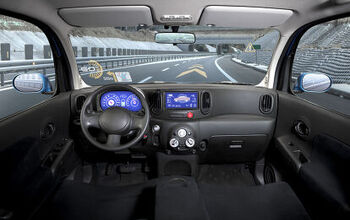No Driver? No Problem: Michigan Just Legalized Autonomous Cars on Public Roads

Vehicles without steering wheels, brake pedals, or even drivers are now allowed to operate on public roads in Michigan.
Today, Gov. Rick Snyder signed a package of auto industry-backed legislation that permits automakers and technology companies to develop, test and even sell autonomous vehicles in the Mitten State. The policy even enables autonomous ride-hailing services, provided that the vehicles have undergone certification.
Michigan is now the wild frontier for self-aware cars.
“By establishing guidelines and standards for self-driving vehicles, we’re continuing that tradition of excellence in a way that protects the public’s safety while at the same time allows the mobility industry to grow without overly burdensome regulations,” Snyder said in a statement today.
Effective regulation has been a slippery fish, however. The National Highway Traffic Safety Administration outlined a 15-point voluntary plan for automakers in September that met with fairly mixed feedback. One of the biggest criticisms being that the NHTSA’s guidelines aren’t specific enough and that the plan’s voluntary nature makes it impossible to enforce.
The new laws have garnered approval from General Motors, Ford, Fiat Chrysler Automobiles, Toyota, Google, Uber, and Lyft.
“The enactment of this legislation affords Michigan the opportunity to be at the forefront of the next major transition in the automotive industry and should serve as a model for other states,” GM said in a statement.
As a “model” state, Michigan’s legislation lets companies use their technology much more liberally. California has also passed passed regulations that only allows for vehicle testing and requires a human to be present in the driver’s seat at all times. Michigan State officials feel the more relaxed regulations should encourage automakers to stay, making it an industry leader.
“We view this legislation as Michigan getting government out of the way of technology and letting it be deployed when it’s ready, but at the same time in a manner that keeps people accountable for keeping people safe on roads,” Michigan Department of Transportation director Kirk Steudle told Forbes. “There’s 100 years of history of automobile companies in Michigan putting test vehicles on the road and putting safe vehicles out.”
Not everyone in the auto industry is happy, however. Uber has taken issue with the contents of one of the bills (SB 996), which allows only motor vehicle manufacturers to participate in an initiative that permits a deployment of on-demand self-driving taxis.
“We oppose SB 996 (the ‘SAVE Act’) and its anti-tech protectionist elements, but SB 995 helps resolve many of those issues, and we appreciate the state enacting those improvements,” an Uber spokeswoman said Friday. “Ultimately, we think it is early in the life of this technology to prescribe state laws, and while these bills may work for Michigan, we do not think they are something other states should use as a model.”
Early or not, it’s just a matter of time before some poor Michigander is terrified by the sight of an empty automobile cruising down the highway in the middle of the night.
[Source: Mlive] [Image: Michigan.gov]

A staunch consumer advocate tracking industry trends and regulation. Before joining TTAC, Matt spent a decade working for marketing and research firms based in NYC. Clients included several of the world’s largest automakers, global tire brands, and aftermarket part suppliers. Dissatisfied with the corporate world and resentful of having to wear suits everyday, he pivoted to writing about cars. Since then, that man has become an ardent supporter of the right-to-repair movement, been interviewed on the auto industry by national radio broadcasts, driven more rental cars than anyone ever should, participated in amateur rallying events, and received the requisite minimum training as sanctioned by the SCCA. Handy with a wrench, Matt grew up surrounded by Detroit auto workers and managed to get a pizza delivery job before he was legally eligible. He later found himself driving box trucks through Manhattan, guaranteeing future sympathy for actual truckers. He continues to conduct research pertaining to the automotive sector as an independent contractor and has since moved back to his native Michigan, closer to where the cars are born. A contrarian, Matt claims to prefer understeer — stating that front and all-wheel drive vehicles cater best to his driving style.
More by Matt Posky
Latest Car Reviews
Read moreLatest Product Reviews
Read moreRecent Comments
- Bd2 Eh, the Dollar has held up well against most other currencies and the IRA is actually investing in critical industries, unlike the $6 Trillion in pandemic relief/stimulus which was just a cash giveaway (also rife with fraud).What Matt doesn't mention is that the price of fuel (particularly diesel) is higher relative to the price of oil due to US oil producers exporting records amount of oil and refiners exporting records amount of fuel. US refiners switched more and more production to diesel fuel, which lowers the supply of gas here (inflating prices). But shouldn't that mean low prices for diesel?Nope, as refiners are just exporting the diesel overseas, including to Mexico.
- Jor65756038 As owner of an Opel Ampera/Chevrolet Volt and a 1979 Chevy Malibu, I will certainly not buy trash like the Bolt or any SUV or crossover. If GM doesn´t offer a sedan, then I will buy german, sweedish, italian, asian, Tesla or whoever offers me a sedan. Not everybody like SUV´s or crossovers or is willing to buy one no matter what.
- Bd2 While Hyundai has enough models that offer a hybrid variant, problem has been inadequate supply, so this should help address that.In particular, US production of PHEVs will make them eligible for the tax credit.
- Zipper69 "At least Lincoln finally learned to do a better job of not appearing to have raided the Ford parts bin"But they differentiate by being bland and unadventurous and lacking a clear brand image.
- Zipper69 "The worry is that vehicles could collect and share Americans' data with the Chinese government"Presumably, via your cellphone connection? Does the average Joe in the gig economy really have "data" that will change the balance of power?



































Comments
Join the conversation
this may well add up to a larger problem than a combination of Flint water and GM ignitions. Snyder's legacy is already tarnished, this destroys it. just hope you or your family aren't the sacrificial lambs. this genie goes back in the bottle once Geoffrey, Sam, and Lee move past chops licking and sink their teeth into some prime meat.
Now, that is scary. It is well known most Detroit vehicles suffer from quality problems. Up till this point, the quality problems mostly cost the owner excessive repair money. Going forward, Detroit quality problems will result in runaway vehicles killing and maiming people. One good quality problem in the software or sensors will put Detroit out of business. Detroit will be unable to pay all the billions in lawsuits.